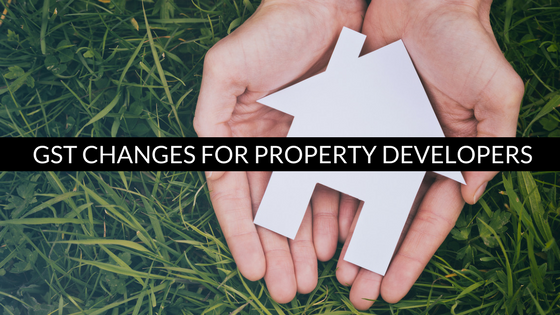New GST changes for Property Developers will significantly affect how GST on sale of property developments is paid to the ATO, will effect from 1 July 2018. Announced in the 2017 Federal Budget, the changes will require the purchasers of new property, to remit the GST directly to the ATO upon settlement. This includes newly constructed residential properties, new subdivisions or substantially renovated homes.
That’s right. 1/11th of the sale price is sent directly to the ATO not paid to the developer as part of the sale proceeds.
These changes have been introduced to improve the integrity of the GST system. The ATO is moving more towards withholding tax at the source of the transaction. The changes are largely a result of some developers failing to remit GST and liquidating companies prior to the BAS payment due date.
How will this affect Cashflow?
Currently, when a property developer sells new residential property, it remits the GST on the next BAS statement to the ATO after taking into account the margin scheme (if applicable) and GST on purchases for that quarter or month.
From 1 July 2018, it will be the purchaser of the property that will remit 1/11th of the sale price, otherwise payable to the vendor, directly to the Australian Tax Office (ATO).
This means that sale proceeds you may have received will be reduced by 1/11th regardless of whether the margin scheme applies will result in less cash in the developers pocket. That means for a $550,000 new residential property, you as the developer will receive $50,000 less proceeds at settlement. If the property is eligible for the margin scheme it may also be a significant amount more in GST then required to be paid also.
How to Minimise the Impact
Register for GST on a Monthly basis
Most property developers know that the best GST reporting method is monthly cash basis. That is, each month a BAS is completed and GST claimed on development costs and related outgoings.
By being registered monthly and lodging quickly, the GST paid directly to the ATO can be applied to your BAS obligations sooner. It also allows any credit between what has been withheld by the purchaser & what is owing (say under the margin scheme) to be refunded more quickly.
Understand your cashflow
If you are undertaking a relatively small development or undertaking a large multi-story unit complex development, understanding and forecasting your cashflow is critical.
Knowing when progress claims are likely to fall, when and how much GST refunds may be and how much is required to be drawn down on finance will assist you in making sure two things –
- The development is profitable.
- You have sufficient cashflow to meet your tax obligations
There is no better opportunity to sit down plan and know your business better.
Review your Contracts & Processes
The contract for the purchase of new homes will need to be reviewed and updated. Contact your lawyer in preparation for 1 July. An instalment contract may need to be considered to ensure the deposit is not taken entirely as GST and remitted to the ATO.
It is also time to review your processes to avoid penalties. Developers will need to issue a notice to withhold 14 days prior to settlement. Penalties will apply for failing to issue the notice.
Transitional relief will continue to apply for contracts signed before 1 July 2018 until 1 July 2020.
Property Developer? Need to know more?
- The Exposure Draft legislation was released for consultation on 6th November 2017 (submissions now closed). Have a read of it here.
Or contact us on (07) 3849 3816 or by hello@goadaccountants.com.au to connect with a small business adviser at Goad Accountants. We are property tax specialists, experienced in dealing with GST for property developments.






